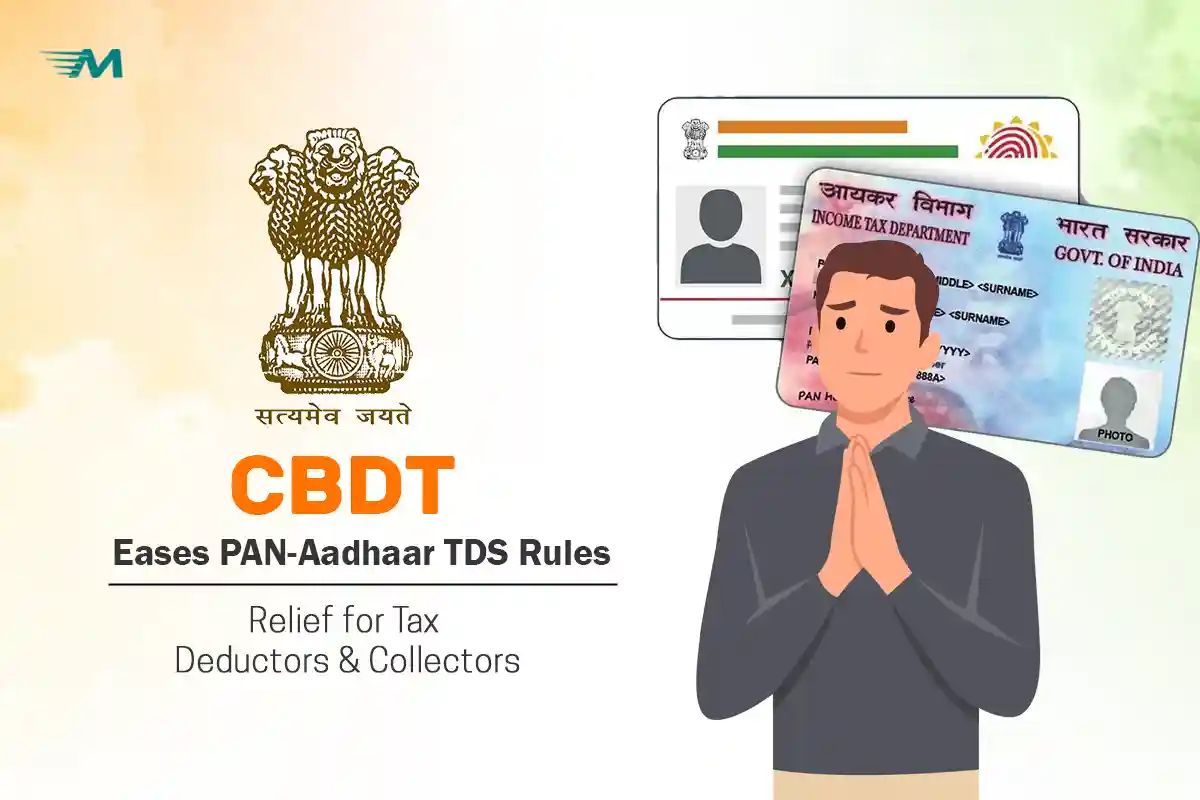CBDT Eases PAN-Aadhaar TDS Rules: Relief for Tax Deductors & Collectors
In a welcome move for businesses and tax professionals, the Central Board of Direct Taxes (CBDT) has introduced significant relief under the PAN-Aadhaar TDS Rules. This announcement addresses the complexities surrounding TDS (Tax Deducted at Source) and TCS (Tax Collected at Source), especially in cases where PAN cards became inoperative due to the failure to link with Aadhaar.
The new relaxation offers a major breather for tax deductors and collectors who were previously burdened by compliance challenges and the risk of penalties resulting from technical mismatches in PAN records.
Understanding the Issue
For some time, PAN-Aadhaar TDS Rules linking has been a mandatory requirement under Indian tax law. If a taxpayer failed to link their PAN with Aadhaar by the government’s deadline, the PAN would become inoperative. This created confusion and complications, especially in transactions where TDS or TCS was applicable.
In many cases, deductors were served notices or flagged for short deductions because the PAN of the payee was not considered valid. Even when all other compliance aspects were followed, this inoperative status triggered automatic mismatch errors in systems like the Income Tax portal and TRACES.
What Has Changed?
With this new clarification, CBDT has effectively acknowledged the operational challenges faced by taxpayers and deductors. It has now been made clear that if a PAN was inoperative at the time of transaction but has been linked with Aadhaar by the time of review or assessment, no penal action or adverse consequence will follow for short deduction or collection.
This decision recognizes that many PAN holders who missed the initial deadline may have linked their Aadhaar later, and therefore, should not be penalized retroactively.
Who Benefits from This Relief?
This move primarily benefits:
- TDS/TCS Deductors and Collectors: Entities responsible for deducting or collecting taxes on behalf of others (like companies, banks, employers) are now protected from penalties for technical shortfalls due to the payee’s inoperative PAN provided the PAN is eventually linked.
- Businesses and Contractors: Organizations working with large vendor bases were particularly vulnerable, as even a single non-compliant PAN could result in system-generated notices and unnecessary scrutiny.
- Individual Taxpayers: Although this relief is primarily aimed at deductors, individuals benefit indirectly, as it reduces the risk of excess deductions, misreporting, or delays in return processing.
Impact on Compliance and Reporting
With the new circular in place, deductors can feel more confident when filing their TDS returns. Previously, many organizations had to err on the side of caution, deducting TDS at a higher rate (20% instead of the applicable rate) due to PAN inoperability even if the mistake wasn’t theirs.
Now, deductors are encouraged to maintain transaction-level records and periodically follow up with vendors, employees, or payees to ensure Aadhaar linking is done promptly. However, the pressure of automatic fault assignment due to PAN status has been reduced.
Implications for FY 2024–25
The timing of this relief is critical as the current financial year progresses. With quarterly TDS returns being filed and assessments ongoing, the clarification provides a window of opportunity for deductors to rectify discrepancies without fear of penalties.
It also sets a precedent for future clarifications acknowledging the importance of technology-driven governance while accommodating genuine delays or human errors.
What Should You Do Now?
- Check PAN-Aadhaar Linking Status: If you are a deductor, ask all vendors, employees, and partners to ensure their PAN is linked to Aadhaar.
- Maintain Communication Records: Keep documented communication showing follow-ups about linking reminders, especially if any PANs were inoperative earlier.
- Update TDS Software Systems: Make sure your accounting or TDS filing software reflects the latest PAN status before return filing.
- Avoid Over Deduction: With this relief, over-deduction due to inoperative PANs can be avoided, provided proper follow-up and compliance is ensured.
- Consult Tax Advisors: If you’re unsure about how this change affects you, especially in light of past transactions, consult your CA or tax consultant.
Final Thoughts
CBDT’s decision to offer relief for short deductions or collections due to previously inoperative PANs shows a shift toward practical compliance rather than rigid penalization. It strikes a balance between digital enforcement and real-world execution of tax norms.
For businesses, this is a cue to stay vigilant yet reassured ensuring proactive communication and updated records while trusting that the system will accommodate genuine efforts at compliance. For individuals and smaller entities, it’s a reminder to stay current with PAN-Aadhaar linking to avoid future disruptions.
As India moves towards a more digitized tax administration system, such balanced measures are essential to encourage participation, reduce fear, and promote voluntary compliance across the board.

